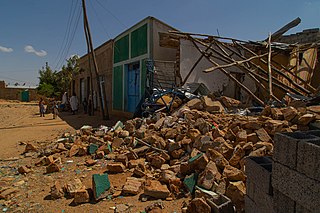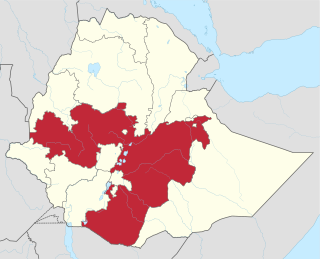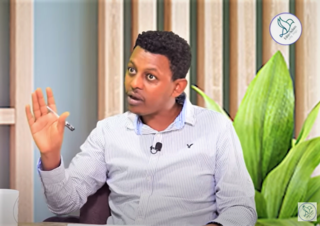Related Research Articles

Internment is the imprisonment of people, commonly in large groups, without charges or intent to file charges. The term is especially used for the confinement "of enemy citizens in wartime or of terrorism suspects". Thus, while it can simply mean imprisonment, it tends to refer to preventive confinement rather than confinement after having been convicted of some crime. Use of these terms is subject to debate and political sensitivities. The word internment is also occasionally used to describe a neutral country's practice of detaining belligerent armed forces and equipment on its territory during times of war, under the Hague Convention of 1907.

Welkait is a woreda in Western Zone, Tigray Region. This woreda is bordered to the north by Humera and to the south by Tsegede. It is bordered on the east by the North West Zone; the woredas of Tahtay Adiyabo and Asgede Tsimbla lie to the north-east, on the other side of the Tekezé River, and Tselemti to the east. The administrative center of Welkait is Addi Remets; other towns in the woreda include Mai'gaba and Awura.

Abiy Ahmed Ali is an Ethiopian politician serving as the third Prime Minister of Ethiopia since 2018, and as the leader of the Prosperity Party since 2019. He was awarded the 2019 Nobel Peace Prize "for his efforts to achieve peace and international cooperation, and in particular for his decisive initiative to resolve the border conflict with neighbouring Eritrea". Abiy served as the third chairman of the Ethiopian People's Revolutionary Democratic Front (EPRDF) that governed Ethiopia for 28 years and the first person of Oromo descent to hold that position. Abiy is a member of the Ethiopian parliament, and was a member of the Oromo Democratic Party (ODP), one of the then four coalition parties of the EPRDF, until its rule ceased in 2019 and he formed his own party, the Prosperity Party.

The Tigray War was an armed conflict that lasted from 3 November 2020 to 3 November 2022. The war was primarily fought in the Tigray Region of Ethiopia between forces allied to the Ethiopian federal government and Eritrea on one side, and the Tigray People's Liberation Front (TPLF) on the other.

The Mai Kadra massacre was a massacre and ethnic cleansing carried out during the Tigray War on 9–10 November 2020 in the town of Mai Kadra in Welkait in northwestern Ethiopia, near the Sudanese border. Responsibility was attributed to a pro-TPLF youth group and forces loyal to the Tigray People's Liberation Front (TPLF) in the EHRC-OHCHR Tigray Investigation, preliminary investigations by Amnesty International, the Ethiopian Human Rights Commission (EHRC) and the Ethiopian Human Rights Council (EHRCO), and interviews conducted in Mai Kadra by Agence France-Presse. The Office of the United Nations High Commissioner for Human Rights (OHCHR) and EHRC reported that at least 5 Tigrayans were killed in Mai Kadra by Amhara militas such as Fano in retaliation. Tigrayan refugees in Sudan told multiple news outlets that Tigrayans in Mai Kadra were targeted by either Amhara militias, the Ethiopian National Defense Force (ENDF), or both.

Ethnic discrimination in Ethiopia during and since the Haile Selassie epoch has been described using terms including "racism", "ethnification", "ethnic identification, ethnic hatred, ethnicization", and "ethnic profiling". During the Haile Selassie period, Amhara elites perceived the southern minority languages as an obstacle to the development of an Ethiopian national identity. Ethnic discrimination occurred during the Haile Selassie and Mengistu Haile Mariam epochs against Hararis, Afars, Tigrayans, Eritreans, Somalis and Oromos. Ethnic federalism was implemented by Tigray People's Liberation Front (TPLF) leader Meles Zenawi and discrimination against Amharas, Ogaden, Oromos and other ethnic groups continued during TPLF rule. Liberalisation of the media after Abiy Ahmed became prime minister in 2018 led to strengthening of media diversity and strengthening of ethnically focussed hate speech. Ethnic profiling targeting Tigrayans occurred during the Tigray War that started in November 2020.

All sides of the Tigray War have been repeatedly accused of committing war crimes since it began in November 2020. In particular, the Ethiopian federal government, the State of Eritrea, the Tigray People's Liberation Front (TPLF) and Amhara regional forces have been the subject of numerous reports of both war crimes and crimes against humanity.

The OLA insurgency is an armed conflict between the Oromo Liberation Army (OLA), which split from the Oromo Liberation Front (OLF) in 2018, and the Ethiopian government, continuing in the context of the long-term Oromo conflict, typically dated to have started with the formation of the Oromo Liberation Front in 1973.

The 2021–2022 Ethiopian state of emergency was issued by the Ethiopian Government on 2 November 2021 and put into effect on 5 November by the Ethiopian parliament, which acted the bill from the executive government of the country into law. The six month state of emergency grants federal authorities "sweeping powers to arrest and detain critics, impose curfews and restrict the news media" as well as conscript any citizen over 18 to fight in the Tigray War.

The TDF–OLA joint offensive was a rebel offensive in the Tigray War and the OLA insurgency starting in late October 2021 launched by a joint rebel coalition of the Tigray Defense Forces (TDF) and Oromo Liberation Army (OLA) against the Ethiopian National Defense Forces (ENDF) and government. The TDF and OLA took control of several towns south of the Amhara Region in the direction of the Ethiopian capital Addis Ababa in late October and early November. Claims of war crimes included that of the TDF extrajudicially executing 100 youths in Kombolcha, according to deral authorities.
This Timeline of the Tigray War is part of a chronology of the military engagements of the Tigray War, a civil war that began in the Tigray Region of Ethiopia in early November 2020.

Predictions of a genocide in Ethiopia, particularly one that targets Tigrayans, Amharas and/or Oromos, have frequently occurred during the 2020s, particularly in the context of the Tigray War and Ethiopia's broader civil conflict.

Tigrayan nationalism is an ethnic nationalism that advocates the interests of Tigrayan people in Ethiopia. Inspired predominantly by the Tigray People's Liberation Front (TPLF) with its predecessor Tigray Liberation Front (TLF), this type of nationalism holds that Tigrayans are an independent group with unique ancestry, heritage, history and culture outside Ethiopia. As such, they claim Tigray is the source of Ethiopian civilization and utterly a benefactor of state-building without other local ethnic groups. Tigrayan nationalists accuse Amharas of imposing their cultural, economic and political hegemony over Tigrayans.

Since the 1990s, the Amhara people of Ethiopia have been subject to ethnic violence, including massacres by Tigrayan, Oromo and Gumuz ethnic groups among others, which some have characterized as a genocide. Large-scale killings and grave human rights violations followed the implementation of the ethnic-federalist system in the country. In most of the cases, the mass murders were silent with perpetrators from various ethno-militant groups—from TPLF/TDF, OLF–OLA, and Gumuz armed groups.
The Amhara Association of America (AAA) (Amharic: የዐማራ ማህበር በአሜሪካ) is a non-profit organization based in Charlotte, North Carolina, focused on advocating for the human rights of the Amhara people in Ethiopia.

The Addis Ababa Federal Police is the law enforcement division of the Ethiopian Federal Police operating in Addis Ababa City Administration. Established in 2003 by Proclamation of Council of Ministers No.96/2003, it has the main duty of safeguard public security and peace and comply to the Constitution and the law of the country by preventing crimes. It is administered by the Addis Ababa City Administration Police Commission, which is responsible to the Federal Police Commission of Ethiopia.
The Kombolcha massacre was the mass extrajudicial and summary execution of over 100 ethnic Amhara civilian youths by the Tigray Defense Forces in South Wollo, in the Amhara Region of Ethiopia. Bodies of the victims were set on fire at a business compound in the town. Kombolcha was described as a key warring location and is found on the A2 highway leading into Addis Ababa, where the Tigrayan forces were advancing to the capital. Looting of aid, and private and public properties was also reported. Kombolcha town is the industrial hub of the Amhara region.

The Welkait question involves a controversial territorial dispute surrounding the Ethiopian area Welkait, which is situated in the present-day Amhara Region. Welkait had been an independent area but was incorporated within Begmeder province as the population traditionally has been closer to the Amharic-speaking area of Gonder than to Tigray, but both Amharic and Tigrinya languages are used in daily life, but also other languages such as Arabic since the region is close to the Sudanece border. But after the fall of the Derg in 1991, the area was given by the TPLF government to Tigray's Western Zone, after it held and dominated national power at Addis ababa, without the consent of the indigenous people of Welkait nor of the people of its mother region, Begmeder, and the Ethiopian people at large.Subsequently, local people of Welkait started demanding for self determination, which was met with violent repression by the TPLF of Tigray, large scale human right abuse and killing was commonplace. TPLF also attempted to change the demography of the area by settling hundreds of thousands of Tigrayans from the Tigray region while forcefully expelling indigenous Welkaites form their land resulting in tens of thousands seeking refuge to Sudan. During Abiy Ahmed administration, the Tigray and Welkait Committee counterparts held peaceful talks in Gondar on 19 April 2018. Abiy pleaded the Welkait question should be addressed in peaceful resolution.

Political repression is a visible scenario under the leadership of Prime Minister Abiy Ahmed after 2018, characterized by severe human rights violation, restriction of press, speeches, dissents, activism and journalism that are critical to his government. Similar to TPLF-led EPRDF regime, there was a raise of censorship in the country, particularly internet shutdowns under the context of anti-terror legislation labelling them "disinformation and war narratives" since the raise of armed conflict in Ethiopia. In June 2018, Abiy unblocked 64 internet access that include blogs and news outlets.

Anti-Tigrayan sentiment is a broad opposition, discrimination, hatred and bias against Tigrayans that reside in northern Ethiopia. During the EPRDF era, anti-Tigrayan views have been common among Ethiopians, particularly after the 2005 general election. Not only the irregularities of election caused the sentiment, but also the EPRDF was becoming more authoritarian dictatorship. It also created discontent among Amharas and Oromos; the Oromos demanded justice after an abrupt master plan to expand boundaries of Addis Ababa into Oromia Region, resulted in mass protests.
References
- 1 2 3 4 5 6 Jonathan Hutson (25 September 2021). "Eyewitness accounts, video confirm reports of Tigrayan children held in concentration camp". Salon.com . Wikidata Q125771844. Archived from the original on 2 May 2024.
- 1 2 3 4 5 Lucy Kassa (7 November 2021). "'They just vanished': Tigrayans disappear for months in secret Ethiopian detention camps". The Globe and Mail . ISSN 0319-0714. Wikidata Q125771289. Archived from the original on 2 May 2024.
- 1 2 Clark, Helen; Lapsley, Michael; Alton, David (2021-11-26). "The warning signs are there for genocide in Ethiopia – the world must act to prevent it". The Guardian . Archived from the original on 2021-11-27. Retrieved 2021-11-27.
- 1 2 Lucy Kassa (28 July 2022). "Eritrean refugees say they are being arbitrarily detained in Ethiopian camps". The Guardian . ISSN 0261-3077. Wikidata Q125776798. Archived from the original on 4 August 2023.
- 1 2 The Silent Suffering of the Amhara People in Ethiopia, European Centre for Law and Justice, April 2024, Wikidata Q125791341, archived from the original on 4 May 2024
- 1 2 3 4 5 6 Active Genocide Alert - Ethiopia in Amhara Region, Lemkin Institute for Genocide Prevention, 23 September 2023, Wikidata Q125776827, archived from the original on 2 May 2024
- 1 2 Paravicini, Giulia; Endeshaw, Dawit; Houreld, Katharine (2021-05-07). "Ethiopia's crackdown on ethnic Tigrayans snares thousands". Thomson Reuters. Archived from the original on 2021-07-13. Retrieved 2021-07-13.
- ↑ Fasil, Mahlet (2021-05-10). "News: Tigrayans repatriated from Saudi Arabia kept in detention, police unwilling to comment". Addis Standard . Archived from the original on 2021-05-18. Retrieved 2021-07-13.
- 1 2 "News Analysis: Fresh wave of arbitrary arrest of Tigrayans in Addis Abeba; Rights commission says it is monitoring the situation, Fed. police deny arrests target Tigrayans". Addis Standard . 2021-07-05. Archived from the original on 2021-07-13. Retrieved 2021-07-13.
- ↑ Lucy Kassa (5 September 2021). "Ethiopia's Tigrayans rounded up, mutilated and dismembered in civil war ethnic purge". The Daily Telegraph . ISSN 0307-1235. Wikidata Q125772161. Archived from the original on 4 May 2024.
- ↑ Jon Sharman (6 September 2021). "Thousands thrown into concentration camps and others butchered in Ethiopia ethnic purge, report says". The Independent . ISSN 1741-9743. Wikidata Q125771336. Archived from the original on 2 May 2024.
- ↑ Anna, Cara (2021-11-08). "People fleeing Ethiopia allege attacks, forced conscription". Associated Press . Archived from the original on 2021-11-08. Retrieved 2021-11-08.
- 1 2 Abdi Latif Dahir (17 November 2021). "Mass Detentions of Civilians Fan 'Climate of Fear' in Ethiopia". The New York Times . ISSN 0362-4331. Wikidata Q125771296. Archived from the original on 19 November 2021.
- ↑ Ross, Eric; Hill, Nat (2021-11-20). "Genocide Emergency: Ethiopia". Genocide Watch . Archived from the original on 2021-11-23. Retrieved 2021-11-23.
- 1 2 3 4 Katharine Houreld (4 December 2022). "Ethiopian guards massacred scores of Tigrayan prisoners, witnesses say". The Washington Post . ISSN 0190-8286. Wikidata Q125771263. Archived from the original on 4 December 2022.
- ↑ Mustapha, Ogunsakin (2021-11-26). "Group warns UN over imminent genocide in Ethiopia". Citizens' Gavel . Archived from the original on 2021-11-27. Retrieved 2021-11-27.